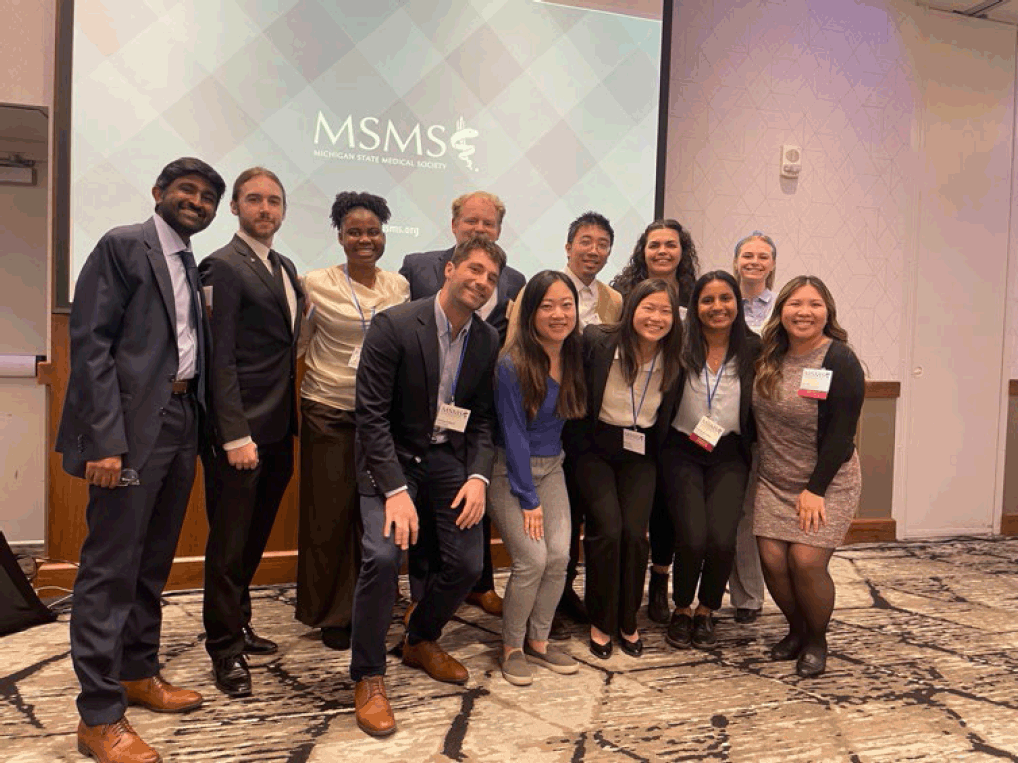Michigan State Medical Society (MSMS) Student Attendees to the House of Delegates.

Legend: Medical students who attended the MSMS House of Delegates (HOD) pose for a picture with physician members following the HOD meeting.
Tai Metzger1
doi: http://dx.doi.org/ijms.2024.2738
Volume 12, Number 4: 479-481
Received 08 06 2024; Rev-request 11 07 2024; Rev-recd 13 07 2024; Accepted 25 10 2024
Organized medicine is when physicians come together to form professional organizations with the goal of advocating for themselves and patients in the public square. It consists of local, state, national, and international groups of physicians engaging with health policy and representing the interests of physicians and their patients. Examples include state medical societies, international specialty-specific groups, and national associations like the American Medical Association (AMA).
My interest in organized medicine stems from my desire to improve the field of medicine through engagement in health policy, not just scientific advancement. Growing up in the Washington, D.C. area, surrounded by politicians, lobbyists, and diplomats, I was able to see the importance of organized and passionate advocacy in making impactful change. Thus, when I started medical school, I joined my school's chapter of the AMA and was later selected to be our delegate to the Michigan State Medical Society (MSMS), our state's section of the AMA.
Our medical student chapter of the AMA worked on drafting resolutions to submit to MSMS and AMA that we believed could improve the practice of health in our state, including decreasing language barriers for patients, providing free feminine products, and increasing access to fentanyl testing strips. Part of my role as our MSMS delegate was to advocate for our resolutions at the committee hearings leading up to the MSMS House of Delegates (HOD) meeting and at the HOD itself if necessary, as well as vote on other resolutions at the HOD. At the committee hearings, the resolution authors and I explained the necessity of our resolutions and received feedback from the physician members of the MSMS before the HOD would vote on the resolutions. This helped me to grow in my ability to collaborate with peers for important causes while also giving me an experience on how to advocate for changes we want to see in medicine (Figure 1).
Figure 1Michigan State Medical Society (MSMS) Student Attendees to the House of Delegates.

Attending the MSMS HOD meeting was one of the most eye-opening and transformative experiences of my medical school journey. This meeting provided the perfect platform to witness firsthand how organized medicine operates and how impactful physician voices can be in shaping the future of healthcare. The event took place in Lansing, our state capital, and was a full day of robust discussions and debate, voting, and connecting with physicians from across the state (agenda can be found in Table 1).
Table 1.Michigan State Medical Society House of Delegates Meeting Agenda.
| Time | Event |
|---|---|
| 8:00 am – 4:00 pm | Registration – Center Lobby |
| 10:00 – 11:00 am | Candidate Forum – Royale Ballroom Report from Chair of the Board Address of the CEO Address of the President Address of the President-Elect |
| 10:30 am – 2:00 pm | Voting – Packard Room |
| 11:00 am – 3:00 pm | Report of the Committee on Credentials and Tellers – Royale Ballroom |
| (Working Lunch) | Nominations and Elections |
| 3:00 – 4:00 pm | Reports of the Reference Committees President's Reception – Royale Atrium |
Walking into the conference room at the start of the HOD meeting, I was struck by the diversity of attendees. Physicians from various specialties, practice settings, and stages in their careers filled the room. The atmosphere buzzed with a mix of camaraderie and a shared sense of purpose. Here were individuals who, despite their busy clinical schedules, dedicated time and energy to advocate for the betterment of our profession and the health of our communities.
As the sessions began, I was immediately immersed in discussions that spanned a wide range of topics—everything from guidelines for newborn eye screening and cannabis use to plastic surgery medical tourism policies and the frequency of implicit bias training. A full list of topics discussed can be found in the MSMS HOD Handbook online.1 The debates were passionate and informed, reflecting the deep commitment these physicians had to their patients and their profession. What impressed me most was the level of respect and collegiality, even when opinions differed vastly on controversial topics. It was clear that everyone in the room shared a common goal: to improve the practice of medicine and the health outcomes of the population.
One example that stood out to me was the disagreement over the MSMS stance on single-payer healthcare reform. Although the MSMS and the AMA had been debating the topic for years, the members still took the time to hear thorough discussions from both sides of the issue. While I could tell that members on each side of the issue were very passionate about their stance, and would not stop advocating for their beliefs, once the time for debating this issue concluded, everyone on both sides of the debate was able to accept the ultimate voting results, return to their seats, and continue respectful and collegial dialogue for the following discussions. Everyone there knew that even those who disagreed with them were physicians like themself who cared fiercely for their patients and the health of the public.
My involvement in organized medicine has also influenced my own views and perspectives on healthcare policies and practices. For instance, prior to attending the HOD I was not aware of the importance of water safety policies. However, after learning that drowning is the leading cause of death in the United States for children aged 1-4,2 and that swim lessons at this age can decrease risk of drowning by 88 percent,3 I now fully support policies that promote water safety measures. Another issue where my perspective changed was regarding plastic surgery medical tourism, which is when patients travel to other states or countries to receive cosmetic surgery. Previously, I did not see a place for physicians to prevent this, but after learning about the risks and dangers I now support—and voted in favor of–the MSMS informing the public about these potential harms.
Throughout the meeting, I had the opportunity to network with physicians who were more than willing to share their experiences and offer guidance. Their encouragement and willingness to mentor young medical professionals like myself were uplifting. One conversation that stood out was with a physician who had been actively involved in the MSMS for over two decades. He emphasized that being involved in organized medicine had enriched his career in ways he hadn't anticipated. It had provided him with a broader perspective on healthcare, allowed him to contribute to meaningful changes, and connected him with a supportive community of like-minded professionals.
Figure 2Michigan State Medical Society House of Delegates

I was able to witness this community at the reception following the conclusion of the official proceedings and votes. After spending the entire day engaged in intense dialogue and difficult votes over important issues, the physicians were able to come together for friendly and relaxed conversation and good food. I was once again reminded that although we often have disagreements, we are united by our shared profession.
This experience at the MSMS HOD meeting solidified my desire to be involved in organized medicine. I realized that as future physicians, we have a responsibility not only to our patients but also to our profession. Being a part of organized medicine offers a unique opportunity to influence healthcare policies, advocate for our patients and colleagues, and ensure that our voices are heard in the larger healthcare landscape.
I encourage all medical students, and practicing physicians, to seek out similar experiences during their education and beyond. Whether it's attending local or national medical society meetings, participating in student government, or joining advocacy groups, these opportunities provide invaluable insights into the broader context of our work as physicians. They allow us to see beyond the walls of our classrooms and clinics and understand the complexities of the healthcare system we are entering.
Moreover, being involved in organized medicine helps cultivate leadership skills that are crucial for our future roles. It teaches us how to effectively communicate, negotiate, and collaborate with a diverse group of stakeholders. In particular, working with my classmates on drafting our resolutions improved my teamwork and professional writing skills, while attending the committee hearings and HOD showed me how to use reliable evidence and public speaking skills to support one's positions. There are also abundant opportunities for networking and mentorship with physicians farther along in their careers. These are skills and resources that will serve us well, whether we are advocating for a patient, leading a healthcare team, or contributing to policy discussions. This experience has convinced me to be involved in organized medicine for the rest of medical school and also when I am a practicing physician.
In conclusion, my experience at the Michigan State Medical Society House of Delegates meeting was a pivotal moment in my medical education. It opened my eyes to the importance of physician advocacy and the power of organized medicine. It inspired me to commit to being an active participant in shaping the future of healthcare. To my fellow medical students, I urge you to seek out these experiences. They will not only enrich your understanding of medicine but also empower you to make a meaningful impact in your career and beyond. Let us be the generation of physicians who are not only skilled clinicians but also passionate advocates for our profession and our patients.
Thank you to the MSMS and my classmates who are also involved in health advocacy.
The Authors have no funding, financial relationships or conflicts of interest to disclose.
Writing - Original Draft: TM.
1. Michigan State Medical Society. House of Delegates Handbook. Available from: https://www.msms.org/About-MSMS/House-of-Delegates. Last updated May 11, 2024; Cited July 13, 2024
2. Centers for Disease Control and Prevention (CDC). Drowning Facts. Available from: https://www.cdc.gov/drowning/data-research/facts/?CDC_AAref_Val=https://www.cdc.gov/drowning/facts. Last updated Feb 19, 2024; Cited July 12, 2024.
3. Brenner RA, Taneja GS, Haynie DL, Trumble AC, Quan C, Klinger RM, et al. Association between swimming lessons and drowning in childhood: a case-control study. Arch Pediatr Adolesc Med. 2009;163(3):203–210.
Tai Metzger, 1 First-year Medical Student. Oakland University William Beaumont School of Medicine, Rochester, Michigan, United States.
About the Author: Tai Metzger is currently a first-year medical student at Oakland University William Beaumont School of Medicine in a four year program. He is also a recipient of the Outstanding M1 Student Award for the 2023-2024 academic year.
Correspondence: Tai Metzger. Address: 586 Pioneer Dr, Rochester, MI 48309, USA. Email: tmetzger@oakland.edu
Editor: Francisco J. Bonilla-Escobar; Student Editors: Prabhav Tekam & Saloni Dedhia; Copyeditor: Adnan Mujanovic; Proofreader: Laeeqa Manji; Layout Editor: Julian A. Zapata-Rios; Process: Peer-reviewed
Cite as Metzger T. Lessons Learned from Being Involved with Organized Medicine as a First-year Medical Student. Int J Med Stud. 2024 Oct-Dec;12(4):479-481.
Copyright © 2024 Tai Metzger
This work is licensed under a Creative Commons Attribution 4.0 International License.
International Journal of Medical Students, VOLUME 12, NUMBER 4, December 2024